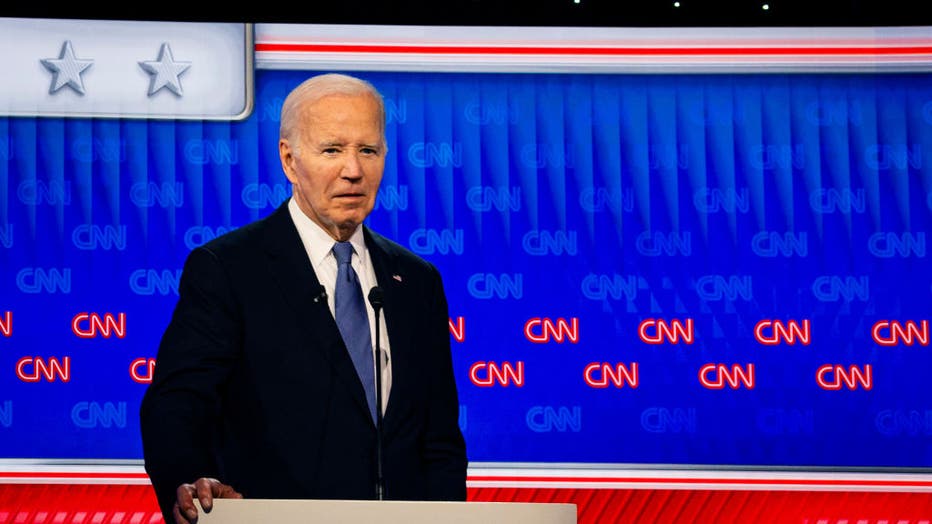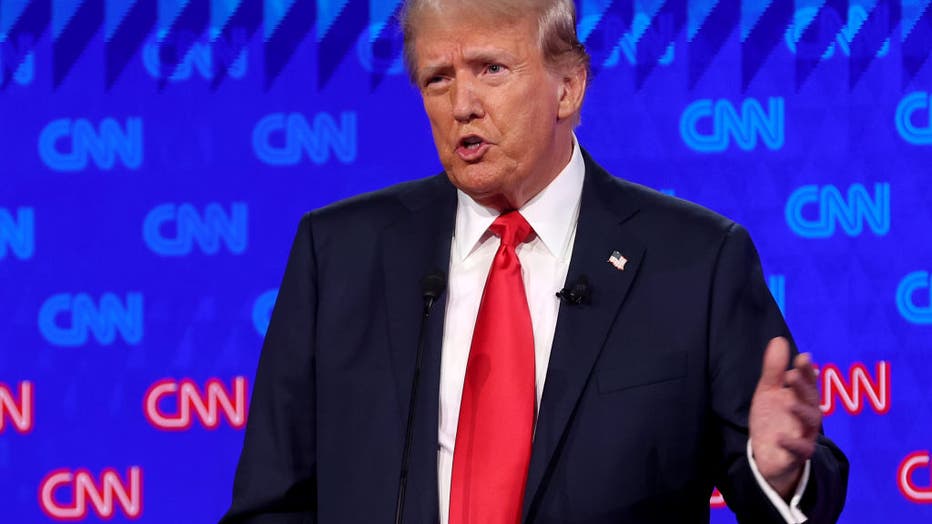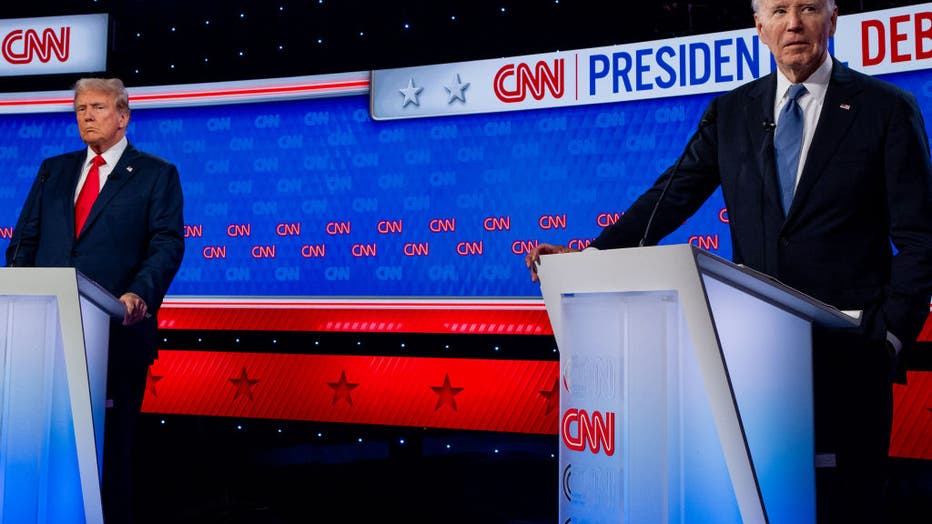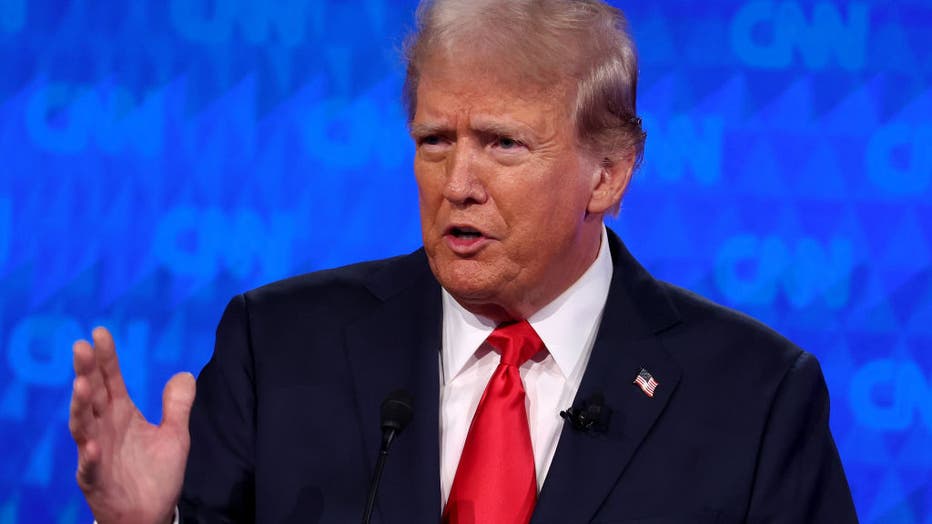Biden’s raspy voice to Trump’s golf boasts: 5 takeaways from the first presidential debate
ATLANTA, GEORGIA - JUNE 27: U.S. President Joe Biden (R) and Republican presidential candidate, former U.S. President Donald Trump participate in the CNN Presidential Debate at the CNN Studios on June 27, 2024 in Atlanta, Georgia. President Biden and
ATLANTA - The first presidential debate of 2024 between President Joe Biden and former President Donald Trump was a highly anticipated event, drawing millions of viewers eager to hear the candidates' positions on crucial issues.
Featured
Biden, Trump face off in 1st 2024 presidential debate
The much-anticipated first presidential debate of 2024 took place as America watched President Joe Biden and former President Donald Trump discuss the issues at the top of constituents’ minds.
The debate, marked by sharp exchanges, provided several key takeaways. Here are 5!
Biden's Voice

US President Joe Biden during the first presidential debate with former US President Donald Trump, not pictured, in Atlanta, Georgia, US, on Thursday, June 27, 2024. Biden and Trump are facing off for their first 2024 debate, a high-stakes opportunit
One of the most talked-about aspects of the debate was President Biden's voice. As he answered the first question about the economy, Biden's voice sounded hoarse, at times as if he was whispering. This prompted viewers to take to social media to question the change in his voice.
According to the Associated Press, Biden has a cold. The source, who was not authorized to speak publicly about the president’s health, confirmed that Biden tested negative for COVID-19 ahead of the debate.
Trump on Immigration Policy

ATLANTA, GEORGIA - JUNE 27: Republican presidential candidate, former U.S. President Donald Trump participates in the CNN Presidential Debate at the CNN Studios on June 27, 2024 in Atlanta, Georgia. Former President Trump and U.S. President Joe Biden
Former President Trump aggressively focused on immigration policy throughout the debate. When asked about a range of topics including climate change, Jan. 6, social security, and the economic progress of Black Americans, Trump frequently pivoted to the issue of border security. He claimed that illegal immigrants are "taking Black jobs and they’re taking Hispanic jobs." His continued emphasis on immigration has been a central theme of his campaign.
Biden, Trump address their age

ATLANTA, GEORGIA - JUNE 27: U.S. President Joe Biden and Republican presidential candidate, former President Donald Trump participate in the CNN Presidential Debate at the CNN Studios on June 27, 2024 in Atlanta, Georgia. The debate is the first of t
Age was another prominent topic during the debate. President Biden was asked how he would address concerns about his ability to handle the presidency well into his 80s. He responded by pointing out that he had spent much of his career being criticized for being too young in politics, noting, "I was the second-youngest person ever elected to the United States Senate, and now I’m the oldest. This guy is three years younger and a lot less competent."
Trump, on the other hand, mentioned that he had taken two cognitive tests and "aced" them. He also pointed to recent golf club championships he had won, arguing that one must be "quite smart" and physically capable to achieve such feats. Gallup data collected in June showed that about 59% of U.S. adults are "very concerned" that Biden is too old to be president, while only 18% have the same level of concern about Trump.
Golf Swings
Golf became a surprising point of contention. Trump, an avid golfer, boasted about recently winning two regular club championships. He claimed that to do so, one has to be "quite smart" and able to "hit the ball a long way."
"He doesn’t do it. He can’t hit a ball 50 yards," Trump said. "He challenged me to a golf match — he can’t hit a ball 50 yards."
Biden countered by suggesting a driving contest and mentioned his handicap when he was vice president. The exchange continued with Trump doubting Biden's golfing abilities, to which Biden replied, "You are a child."
Accepting the Results of the Election

ATLANTA, GEORGIA - JUNE 27: Republican presidential candidate, former U.S. President Donald Trump delivers remarks during the CNN Presidential Debate at the CNN Studios on June 27, 2024 in Atlanta, Georgia. Former President Trump and U.S. President J
A crucial issue discussed was the acceptance of the election results. Despite being asked three times, Trump did not directly affirm that he would accept the election results regardless of the outcome. Instead, he repeatedly stated that he would accept the results "if it’s a fair and legal and good election."
This non-committal stance followed his denouncement of political violence on Jan. 6 as "totally unacceptable," but left unanswered questions about his commitment to a peaceful transfer of power.


